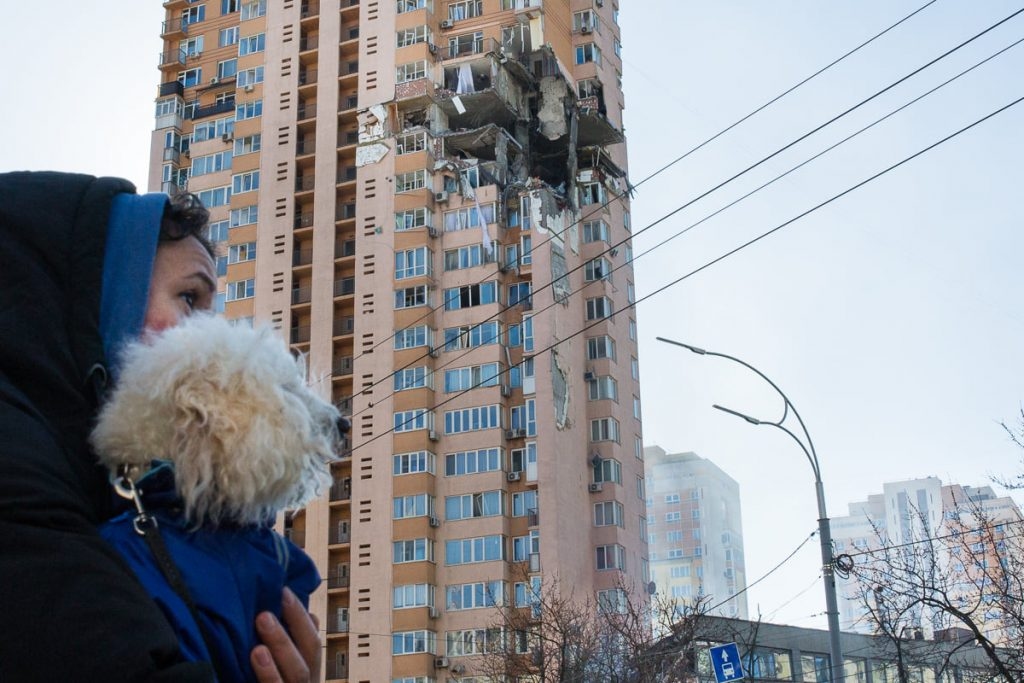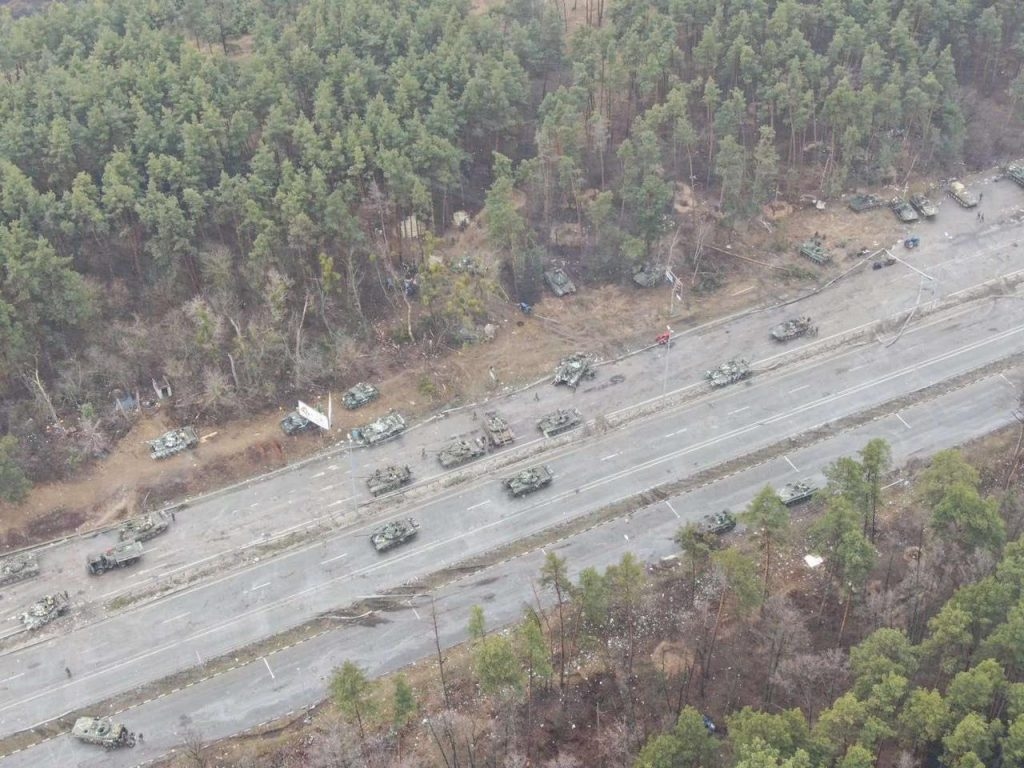Russian soldiers kill mother of two as she drives family to safety

In the early morning of March 1, Svitlana Zhulina was driving her family away from war-torn Kyiv Oblast. Her husband, Andriy Vilson, was sitting next to her, their two sons of eight and 10 in the back seat.
They were driving along Zhytomyr Highway, a westbound road very familiar to Kyivans. In peacetime, people would use it to get to the Ukrainian “western capital” of Lviv. Now, it was the road to safety.
Suddenly, Andriy heard a loud explosion and his wife’s head fell against him. A sniper’s bullet had hit her.
He stopped the car and rushed to save the rest of his family.
“It was a horror for the kids. The bullet hit the windshield and their mother who was there just a moment ago is gone,” Andriy said.
The doors were blocked, so he got out through the window and started taking his kids out of the car.
“I took Artem first,” Andriy said of his older son, “and they shot me in the right leg. I hid Artem behind the car hood so they could not reach him.”
Andriy then returned for Myroslav, his youngest.
“Myroslav lingered. He looked at my leg, saw a big hole in it, and said: ‘Dad, there’s a hole.’ And right then those bastards shot him in the leg,” he said.
As he was hiding the wounded Myroslav, the Russian soldiers shot his left leg. He fell.
The beginning of the end
Five days prior, Russia had declared a full-scale war on Ukraine. Svitlana, 46, and her brother Oleksii Kurach, 37, decided to take their families out of Kyiv to Berezivka, a nearby village where their parents live.
They wanted to wait it out in Berezivka and see how the events unfolded. For a few days, this plan worked well. It remained quiet in their village, even while Kyiv was being heavily shelled.
On February 26, the building in which Svitlana and Andriy had purchased an apartment in Kyiv was hit by a Russian missile. Six people were injured.

“We were just about to move in there. We had renovated the apartment. It was close to the lyceum, so the kids wouldn’t have had to walk a long distance,” said Andriy.
“Thank God we did not move in,” he had thought when the building was hit.
It felt as though they had managed to escape the danger. Despite the village having been cut off from electricity, water, and cell connection, they thought they were safe in Berezivka. That was before they saw Russian tanks moving past their windows.
It was time to leave, said Inga Kurach, Oleksii’s wife and mother of their young daughter.
“After the Russian column passed our house, we started to hear loud explosions,” she said. “We spent the afternoon in the basement, crying. We all agreed that we needed to leave.”
The next morning, the two families got in their cars to flee the war to western Ukraine.
The Kurach family took the lead, while Svitlana, Andriy, and their two sons followed suit.

They drove slowly, as the debris from shells was scattered across the road. After two kilometers of driving along the highway, they saw a tank on the other side of the road. The “V” sign painted on it indicated that it was Russian.
“I shouted at my husband: ‘Tank! Turn around!’” Inga said, “I was scared.”
As Oleksii was turning around, Russian bullets hit their car.
“The window next to me and my daughter broke first, and then all the others did, too. We bowed our heads. Apparently, it saved us,” Inga said.
They realized that the Svitlana's car was being shelled at and stopped.
“I told my husband: ‘Step on it! They will kill us all now.”
Saving the kids
Andriy and his two sons were lying on the ground next to their car.
“The Russians kept shooting at the car,” he said. “They wanted to get to the kids.”
He then saw a Russian military convoy moving towards them and told his kids to play dead.
“When I imagine what it’s like for a child to be told to lie like you’re dead, and your mother is now dead,” Andriy said, struggling to find words. “It's just…”

When the Russian tanks passed them, the Russian soldiers started a “mopping-up” operation. There was no point in playing dead anymore.
“When the Russian soldiers saw the severity of the [kids’] wounds, they were shocked,” Andriy said.
They then started checking Andriy's smartphone to see whether he had informed the Ukrainian military about the movement of Russian troops.
They found nothing, he said, and then started discussing what to do with him.
“I was bleeding heavily. They realized that they needed to do something,” he said.
They tried to call up their medical officers, but no one came. Eventually, they put tourniquets on his legs.
“They told me: ‘You have two kids to take care of.’ I replied: ‘Thanks to your snipers’,” Andriy recalled.
“They then said: ‘Still, do not die’. I answered: “I will try. Let me save my kids.”
Russian soldiers allowed him to call his wife’s parents, so that they could come and pick them up. The soldiers promised they wouldn’t touch them.
When his parents-in-law arrived, Andriy was feeling dizzy due to serious blood loss, and the Russians helped put him into their car. They did not let them take his wife's body.
Later that day, Svitlana's parents returned to pick up their daughter’s body anyway.
“Grandma and grandpa are heroes,” Andriy said. “They took a wheelbarrow and went there on foot. They opened the car door in front of the Russians, got their child, put her on the wheelbarrow, took some things that were there, and came back.”
Long way to recovery
After the attack, both families had to go back to the village house in Berezivka. Andriy and his youngest son Myroslav urgently needed medical treatment.
His friends found a former military doctor in the village.
“He came every day, despite shelling,” Inga said. “A very brave person.”
“If it weren't for him, we would have certainly had gangrene,” Andriy said. “He stuffed medicine into my wounds with his fingers. He said: ‘Otherwise it will rot’.”

Still, Andriy and his son required inpatient treatment. After six days, they decided to give it another try and get out of the village.
“The doctor called us and said that there was information about a Russian checkpoint that had started letting through cars with white flags,” Inga said.
“We decided to take the risk,” she continued. “With what had happened to us, we felt three times more scared than before.”
Inga and Oleksii grabbed the children, placed the wounded ones in the back seat, and started driving towards the Russian checkpoint. They were asked to stop.
“I was sitting next to my husband in the front seat, holding my daughter close and tilting her head down so they would not hurt her,” Inga recalled.
“I was weeping,” she went on, “The Russians saw it and said: ‘We won't hurt you’.”
They let them go.
Oleksii drove his brother-in-law and nephew all the way to the hospital in Khmelnytskyi, a city in western Ukraine hours away from Kyiv.
Andriy's younger son, Myroslav, underwent surgery and had Ilizarov apparatus, a metal fixator placed on his leg. His recovery will take up to eight months.
The kids are holding up, but the horror of seeing their mother shot dead by a sniper had a devastating effect on them, Andriy said.
“They were shocked when they saw her. ‘Mom, mom’ they screamed. She did not respond,” he went on.









